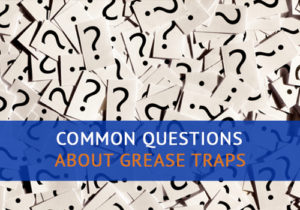If you own a commercial kitchen, you know how essential grease traps are to your business. They are vital to the health and safety of your kitchen. But, there may be some things that you don’t know about these necessary appliances. That’s why we have compiled a list of frequently asked questions about grease traps.

Frequently Asked Questions about Grease Traps
1. Why do you need a grease trap?
Grease, fats, and oils are food residues that come from cooking. These substances can’t be processed like the rest of the waste that goes into your septic tank. These three food products can create blockages in your septic system, causing your wastewater to overflow.
You may not know, but even grease that’s cooled is unsafe to put into your septic system. While it’s liquid now, grease solidifies once it cools down. Putting this down the drain can lead to clogs in the septic pipes and cause your septic system to backup or overflow.
The last thing you want is to threaten the sanitation and health of your business ’s kitchen. Grease traps can prevent clogs, backups, and overflows easily. This is why they are a necessary piece of equipment to every commercial kitchen.
2. How does a grease trap work?
Grease, fats, and oils are byproducts of cooked food. These substances should be kept out of your septic tank because they will interfere with the natural processes inside your system. This includes the effluent bacteria’s ability to break down solid material in the wastewater.
When you have too much of these food byproducts, they can cause overflow and backups in your septic system. Grease traps are vital because they collect these residual products before they make their way to your septic tank.
By catching this type of waste, the grease trap allows wastewater to still flow regularly into the septic system. As soon as this water is free of solid waste, it can be treated like regular wastewater in your septic tank.
However, grease traps are not infallible. A small amount of grease will pass into the septic tank. Therefore, it is essential to perform regular maintenance on the grease trap.
3. Do I need a grease trap even if we don’t cook with grease?
It’s one of the big questions about grease traps. If you don’t cook with grease, do you even need one?
Yes. Grease traps collect more than just grease. This includes oils and fats that can come from other cooking ingredients like:
- Cooking oil
- Butter
- Mayonnaise
- Shortening
- Margarine
Even if your food isn’t necessarily greasy, all food preparation leaves some residue behind.
4. Why is my grease trap overflowing?
Grease traps require regular maintenance. If you do not empty the grease trap regularly, it will experience clogs and potentially backups. This means you could have septic wastewater flooding into the kitchen. This threatens the safety and the cleanliness of your business.
There is also the possibility that it was installed wrong. If you recently had your grease trap installed and already see overflow, call your septic company. There’s a problem.
Schedule an appointment with a septic professional to ensure that your septic system and grease trap continue to perform efficiently.
5. Can I install or work on a grease trap myself?
We do not recommend that you work on a grease trap yourself.
Clermont, Florida has a long list of regulations and requirements to ensure that your grease trap is properly working. Clermont ordinance says that the position and installation of a commercial kitchen’s grease trap must be approved by city planning and must comply county building codes. This guarantees your facility’s safety and the grease trap’s accessibility for regular maintenance.
We also don’t recommend that you clean your grease trap yourself. Many dangers come with trying to do this on your own.
Depending on when you last used the grease trap, the grease inside could still be hot, and you could run the risk of burning yourself. Grease can be messy, causing slippage or falls to you or your employees. Overflow like this can not only be a hassle to clean up but also could cause damage to your floor and the rest of your kitchen.
6. How often should I pump the grease trap?
Most experts say that you should pump the grease trap once it is 25-35% full of solid waste and grease. This ensures that your kitchen will avoid wastewater overflow and will maintain the life of your septic system.
If you can smell odors coming from your grease trap, you’re overdue for a clean.
7. Who can I call if I have any questions about my grease trap?
You can call any septic company that offers grease trap maintenance. However, we guarantee that our certified technicians will clean even the parts that other company’s miss.
We are happy to answer any and all questions about grease traps — it’s what we are here for! Call us at Advanced Septic to schedule your grease trap installation or service. You can reach us at 352.242.6100.

